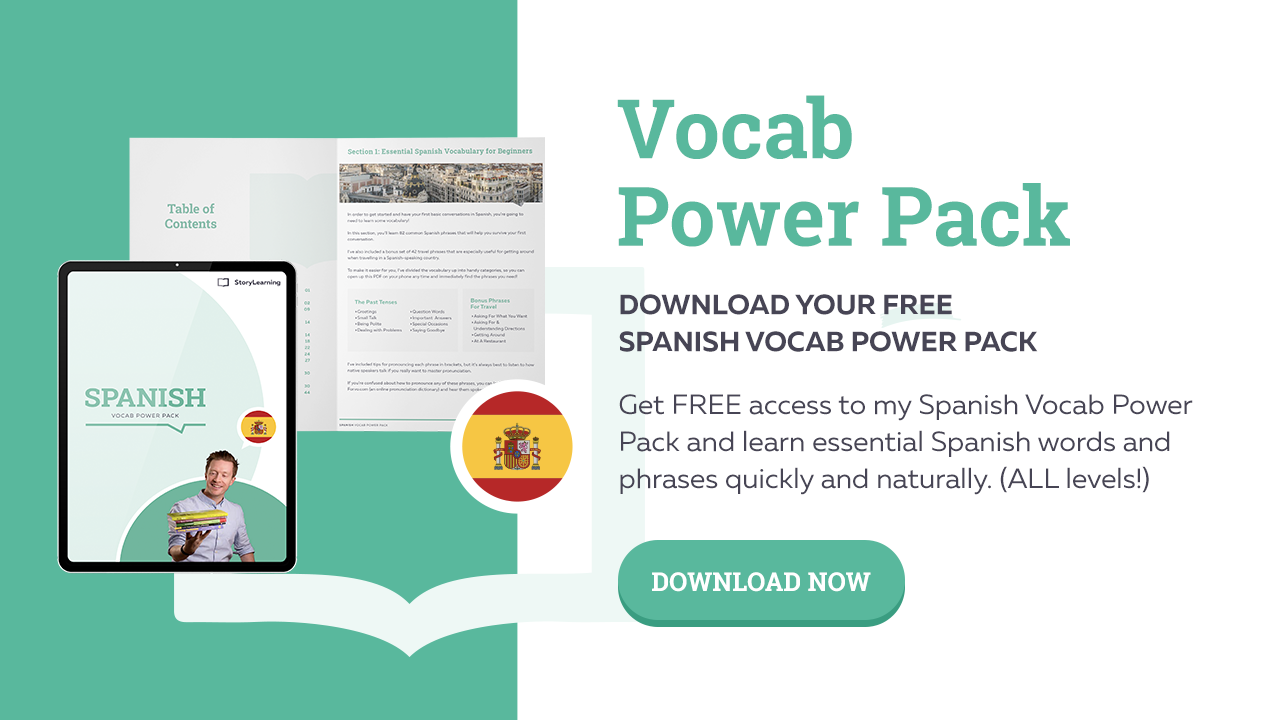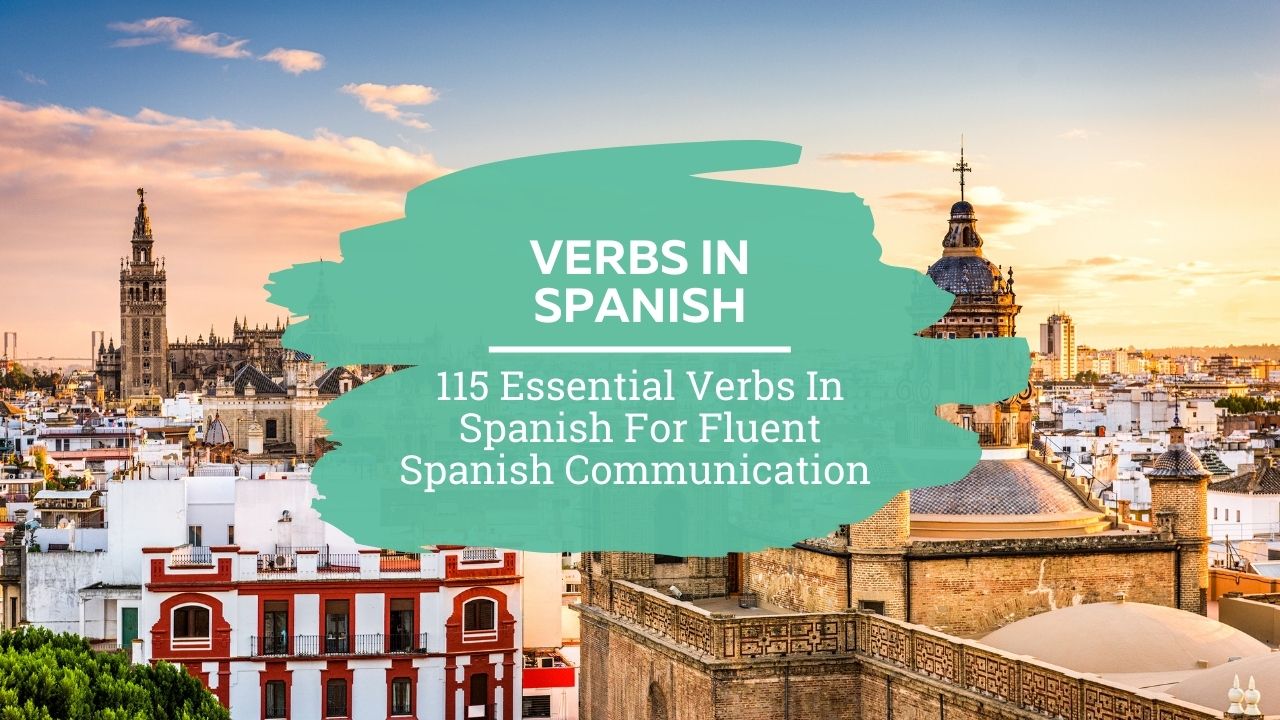When you learn Spanish, or any language, you need to learn vocabulary, first just to get by, but then to express yourself ever more clearly, accurately and eloquently, and one vital group of words you can’t do without is verbs in Spanish.
Retaining a stock of the most important basic verbs is a major step that will allow you to start using a new language to express just about anything you want. So to help you get started, here’s my list of the first 115 essential verbs in Spanish you’ll need to learn.
By the way, if you want to learn Spanish fast and have fun while doing it, my top recommendation is Spanish Uncovered which teaches you through StoryLearning®.
With Spanish Uncovered you’ll use my unique StoryLearning® method to learn Spanish naturally through story… not rules. It’s as fun as it is effective.
If you’re ready to get started, click here for a 7-day FREE trial.
Why Learn Verbs?

Have you ever stopped in the middle of a conversation in Spanish and thought “why am I always using the same words and expressions? I sound so repetitive!”
This is really common.
While learning Spanish, your first instinct might be to quickly memorise more and more vocabulary so that you can talk about all the topics that interest you.
Often, that means learning a lot of nouns (foods you enjoy, jobs and hobbies you have, words for family members and places, etc) and trying to keep them all in your mind as you stumble through your speaking practice.
But, without learning verbs, you may find yourself limited to saying very basic things about those topics: ‘A is B’ or ‘I have X.’
Learning the verbs in Spanish that go with those topics makes it possible to talk about actions as well as things.
For instance, you can tell someone that you cook or eat your favourite food rather than just telling them what your favourite food is.
As you learn more and more, you can even get creative and express more complex sentences, thoughts, and processes. It’s a great way to supercharge your Spanish.
For instance, let’s take a look at these two sentences in English:
- When I went home, I cooked tomatoes and vegetables. I cooked some rice. I cooked some chicken, and I made a stir-fry.
Sound pretty repetitive, doesn’t it? Let’s see this instead:
- When I went home, I sauteed some tomatoes and vegetables. I boiled some rice. I roasted some chicken, and I made a stir-fry.
Now, that sounds delicious!
As we can see, using the correct verbs is crucial to improving your fluency in Spanish so that you can express yourself more precisely!
That’s why I’m providing you with these 115 essential Spanish verbs.
115 Essential Verbs In Spanish

1. Acercar(se) To Move (Something) Closer/To Get Closer (To Something)
- Acerqué la silla a la ventana. (I moved the chair closer to the window.)
Or…
- María se acercó mucho a él para contarle un secreto. (María got very close to him to tell him a secret.)
2. Acordar (To Agree)
Acordaron tener la reunión el jueves por la mañana. (They agreed to have the meeting on Thursday morning.)
3. Apagar (To Switch Off/To Turn Off)
- Voy a terminar este informe antes de apagar el ordenador. (I’m going to finish this report before switching off the computer.)
4. Aparecer (To Appear)
- De repente, apareció su hermano en la habitación. (Suddenly, his brother appeared in the room.)
5. Ayudar (To Help)
Luis siempre me ayuda a limpiar el garaje. (Luis always helps me clean the garage.)
6. Bajar (To Go Down/To Get off)
El ascensor está estropeado, entonces tienes que bajar por las escaleras. (The lift is broken, so you have to go down the stairs.)
7. Beber (To Drink)
- A mi hermana le gusta beber zumo de limón. (My sister likes drinking lemon juice.)
8. Buscar (To Look/Search For)
- Estoy buscando un nuevo trabajo. (I’m looking for a new job.)
9. Caer (To Fall Down/Off)
- El libro cayó de la estantería. (The book fell off the shelf.)

10. Cambiar(se) (To change) /(To Change (Clothes), To Get Changed)
- Ha cambiado mucho desde la última vez que lo vi. (He’s changed a lot since I last saw him.)
Or…
- Voy a cambiarme para ir a la fiesta. (I’m going to get changed to go to the party.)
11. Cerrar (To Close)
- El supermercado cierra a las nueve y media. (The supermarket closes at half past nine.)
12. Coger (To Take/Grab)
- Coge la taza que está encima de la mesa. (Take the mug that is on the table.)
13. Colgar (To Hang)
- Hemos colgado otro cuadro en la pared del dormitorio. (We have hung another picture on the bedroom wall.)
14. Comer (To Eat)
- Laura no puede comer atún porque es alérgica al pescado. (Laura can’t eat tuna because she is allergic to fish.)
15. Compartir (To Share)
- Ana y Marta comparten piso en Madrid. (Ana and Marta share a flat in Madrid.)
16. Comprar (To Buy)
- He comprado un coche. ¿Quieres verlo? (I have bought a car. Would you like to see it?)
17. Comprender (To Understand)
- ¿Comprendes esta palabra? (Do you understand this word?)
18. Conocer (To know)
- No conozco a Juan. (I don’t know Juan.)
19. Conseguir (To Get/Obtain)
- Tengo que conseguir el dinero para mi viaje a Asia. (I have to get the money for my trip to Asia.)

20. Contar (To Tell)
- Me contaste una historia muy divertida. (You told me a very funny story.)
21. Contestar (To Answer/Reply)
- Nunca contesta mis mensajes. (She never answers my messages.)
22. Correr (To Run)
- Los ladrones empezaron a correr cuando llegó la policía. (The thieves started running when the police arrived.)
23. Cumplir (To Accomplish, To Turn (Age))
- Hemos cumplido nuestros objetivos para este año. (We have accomplished our goals for this year.)
Or…
- María cumplió 30 años ayer. (María turned 30 yesterday.)
24. Creer (To Believe)
- Dice que tiene mucho trabajo y yo lo creo. (He says he has a lot of work, and I believe him.)
25. Dar (To Give)
- ¿Puedes darme mi chaqueta, por favour? (Can you please give me my jacket?)
26. Deber (Should)
- Debes estudiar español todos los días para avanzar. (You should study Spanish every day to make progress.)
27. Decidir (To Decide)
- He decidido mudarme a otra ciudad. (I have decided to move to another city.)
28. Decir (To Say/To Tell)
- Dice que no le gustan los plátanos. (He says he doesn’t like bananas.)
29. Dejar (To Leave)
- Deja las llaves encima de la mesa. (Leave the keys on the table.)

30. Descansar (To Rest)
- He trabajado mucho y ahora voy a descansar todo el fin de semana. (I have worked a lot and now I’m going to rest the whole weekend.)
31. Descubrir (To Discover/To Find Out)
- Marina descubrió que su hermano tenía una nueva novia. (Marina discovered that his brother had a new girlfriend.)
32. Despertar(se) (To Wake Someone Up/To Wake Up)
- Despertó a su hijo temprano para ir al colegio. (He woke his son up early to go to school.)
Or…
- Siempre se despierta temprano para ir a trabajar. (He always wakes up early to go to work.)
33. Destruir (To Destroy)
- Las bombas destruyeron la ciudad. (The bombs destroyed the city.)
34. Detener (To Stop/To Arrest)
- La policía detuvo a los ladrones. (The thieves were arrested by the police.)
35. Dormir (To Sleep)
- Está muy cansada porque no duerme bien. (She is very tired because she doesn’t sleep well.)
36. Empezar (To Start)
- Las clases empiezan a las ocho. (The lessons start at eight.)
37. Encantar (To Love To Do Something)
- Nos encanta viajar. (We love travelling.)
38. Encender (To Switch On/To Turn On)
- Enciende la luz porque no veo nada. (Switch the light on because I can’t see anything.)
39. Encontrar (To Find)
- He encontrado tus llaves en mi coche. (I found your keys in my car.)

40. Enviar (To Send)
- Te he enviado un email con toda la información. (I have sent you an email with all the information.)
41. Esconder (To Hide)
- El gato está escondido detrás de la cortina. (The cat is hiding behind the curtain.)
42. Escribir (To Write)
- ¿Sabes que Alicia ha escrito un libro? (Do you know that Alicia has written a book?)
43. Escuchar (To Listen)
- A mis hijos les encanta escuchar música todo el día. (My children love listening to music all day long.)
44. Esperar (To Wait)
- Espera un momento. Tengo que hacer una llamada urgente. (Wait a moment. I need to make an urgent call.)
45. Evitar (To Avoid)
- Es mejor evitar hablar con él cuando está enfadado. (It’s better to avoid talking to him when he is angry.)
46. Explicar (To Explain)
- La profesora nos explicó los tiempos verbales. (The teacher explained the verb tenses to us.)
47. Ganar (To Win)
- ¿Habéis ganado el premio con vuestro proyecto? (Have you won the prize with your project?)
48. Gastar (To Spend)
- No quiero gastar más dinero. (I don’t want to spend more money.)
49. Gustar (To Like)
- No me gustan las fresas. (I don’t like strawberries.)

50. Haber (To Have (Auxiliary)/There Is, There Are (Hay))
- Hemos visto una película muy mala. (We have seen a very bad movie.)
Or…
- Hay mucha gente en este parque. (There are a lot of people in this park.)
51. Huir (To Flee/To Run Away)
- Huyeron del país por la situación política. (They fled the country due to the political situation.)
52. Intentar (To Try/To Attempt)
- Intenté aprender chino, pero no pude. (I tried to learn Chinese, but I couldn’t.)
53. Investigar (To Research)
- Están investigando un nuevo tratamiento para esta enfermedad. (They are researching a new treatment for this illness.)
54. Jugar (To Play)
- Los niños juegan en el jardín. (The kids play in the garden.)
55. Leer (To Read)
- ¿Cuántos libros lees al año? (How many books a year do you read?)
56. Levantar(se) (To Raise/To Get Up)
- Levanta la mano si tienes alguna pregunta. (Raise your hand if you have any questions.)
Or…
- Hoy me he levantado a las seis de la mañana. (Today, I got up at six in the morning.)
57. Llenar (To Fill)
- Voy a llenar esta jarra de agua. (I’m going to fill this jug with water.)
58. Llevar (To Carry/To Take)
- Siempre llevo los libros a clase. (I always take my books to class.)
59. Llorar (To Cry)
- ¿Qué te pasa? ¿Por qué lloras? (What’s wrong? Why are you crying?)

60. Llover (To Rain)
- No me gusta Galicia porque siempre llueve. (I don’t like Galicia because it’s always raining.)
61. Lograr (To Achieve)
- Estoy orgullosa de todo lo que has logrado. (I’m proud of everything you have achieved.)
62. Manejar (To Handle)
- Esta situación es muy difícil de manejar. (This situation is very difficult to handle.)
Note: This verb also means “to drive” in Latin American Spanish.
63. Mantener (To Maintain)
- El juez mantuvo su sentencia. (The judge maintained his sentence.)
64. Mirar (To Look)
- Mira estos gatitos, son preciosos. (Look at these kittens, they are cute.)
65. Mostrar (To Show)
- Quiero mostrarte el cuadro que he pintado. (I want to show you the picture I painted.)
66. Mover(se) (To Move (Oneself))
- Moví el sofá más cerca de la puerta. (I moved the sofa closer to the door.)
Or…
- Deja de moverte, me pones nervioso. (Stop moving, you are making me nervous.)
67. Necesitar (To Need)
- ¿Necesitáis ayuda? (Do you need any help?)
68. Oír (To Hear)
- Habla más alto porque no te oigo. (Speak louder because I can’t hear you.)
69. Oler (To Smell)
- Esas flores huelen muy bien. (Those flowers smell very good.)

70. Olvidar(se) (To Forget)
- He olvidado tu nombre. /Me he olvidado de tu nombre. (I forgot your name.)
71. Pagar (To Pay)
- ¿Quién va a pagar la cuenta? (Who is going to pay the bill?)
72. Parar (To Stop)
- Voy a parar de trabajar para hacer un descanso. (I’m going to stop working to take a break.)
73. Parecer (To Seem)
- Ese chico parece muy simpático. (That boy seems very friendly.)
74. Pedir (To Ask For, To Order (Restaurant))
- María me pidió un vaso de agua. (María asked me for a glass of water.)
Or…
- ¿Ya sabes qué vas a pedir? [en un restaurante]. (Do you know what you are going to order?)
75. Pegar (To Hit)
- Dice que su hermano le ha pegado. (He says his brother has hit him.)
76. Perder (To Lose)
- Nuestro equipo perdió el partido. (Our team lost the match.)
77. Permitir (To Allow)
- El profesor no permite el uso de móviles en clase. (The teacher doesn’t allow mobile phones in the classroom.)
78. Poder (To Be Able To/Can)
- ¿Puedes venir aquí? (Can you come here?)
79. Poner (To Put)
- Pon la botella encima de la mesa. (Put the bottle on the table.)

80. Presentar(se) (To Present/To Introduce)
- Hoy presentamos el nuevo espectáculo. (Today, we present the new show.)
Or…
- Marta nos presentó a su marido. (Marta introduced us to her husband.)
81. Prestar (To Lend)
- ¿Me prestas tu vestido rojo? (Can you lend me your red dress?)
82. Probar (To Try On, To Taste)
- Ayer probé gazpacho por primera vez y estaba buenísimo.(Yesterday, I tasted gazpacho for the first time and it was delicious.)
83. Proteger (To Protect)
- Es importante proteger el planeta. (It’s important to protect our planet.)
84. Quedar(se) (To Arrange To Meet/To Stay)
- Pedro y Lorena quedaron a las ocho en el centro. (Pedro and Lorena arranged to meet at eight in the centre.)
Or…
- Fuimos de vacaciones a Asturias y nos quedamos en un hotel muy bonito. (We went to Asturias on holiday, and we stayed in a very nice hotel.)
85. Quejarse (To Complain)
- Pepe se queja del ruido que hacen sus vecinos. (Pepe complains about the noise his neighbours make.)
86. Querer (To Want/To Love)
- Quiero ir al cine este fin de semana. (I want to go to the cinema this weekend.)
Or…
- Quiero a mi madre. (I love my mum.)
87. Quitar (To Take Off)
- Me quité el abrigo al entrar en casa. (I took my coat off when I entered the house.)
88. Recibir (To Receive)
- Recibí una carta de Hacienda. (I received a letter from the tax office.)
89. Recomendar (To Recommend)
- Me recomendó una película francesa. (She recommended a French movie to me.)

90. Reconocer (To Recognise)
- Pablo se cortó el pelo y no lo reconocí. (Pablo got his hair cut, and I didn’t recognise him.)
91. Recordar (To Remember)
- Recuerda que el examen es mañana. (Remember that the exam is tomorrow.)
92. Regresar (To Return, To Come Back)
- Regresé a casa a las diez después de un largo día de trabajo. (I came back home at ten after a long working day.)
93. Reír (To Laugh)
- Les conté un chiste y todos rieron. (I told them a joke, and they all laughed.)
94. Repetir (To Repeat)
- ¿Puedes repetir la pregunta, por favour? (Can you repeat the question, please?)
95. Resolver (To solve)
- Ya hemos resuelto el problema. (We have already solved the problem.)
96. Responder (To Answer/To Reply)
- ¿Por qué no quieres responder mi pregunta? (Why don’t you want to answer my question?)
97. Robar (To Rob/To Steal)
- Los ladrones robaron un banco. (The thieves robbed a bank.)
98. Romper (To Break)
- Juan rompió la lámpara. (Juan broke the lamp.)
99. Salir (To Go Out)
- Anoche salimos a tomar algo. (Last night, we went out for a drink.)

100. Seguir (To Follow/To Continue)
- Mi gato me sigue por toda la casa. (My cat follows me around the house.)
Or…
- Vamos a seguir con la lección. (We are going to continue with the lesson.)
101. Sentarse (To Sit Down)
- Juan siempre se sienta al lado de Lucía en clase. (Juan always sits next to Lucía in the classroom.)
102. Sentir(se) (To Feel (+ Noun)/To Feel (+ Adjective Or Adverb))
- Todavía puedo sentir la emoción de nuestra victoria. (I can still feel the excitement of our victory.)
Or…
- Me siento feliz cuando estoy contigo. (I feel happy when I’m with you.)
103. Sonar (To Sound)
- Esa canción suena muy bien. (That song sounds very good.)
104. Soñar (To Dream)
- María sueña con ser escritora. (María dreams about being a writer.)
105. Sonreír (To Smile)
- Me encanta cuando me sonríe. (I love it when he/she smiles at me.)
106. Subir (To Go Up, To Get On)
- Estoy muy cansado, no puedo subir las escaleras. (I’m very tired, I can’t go up the stairs.)
107. Sugerir (To Suggest)
- No sé qué hacer. ¿Qué me sugieres? (I don’t know what to do. What do you suggest?)
108. Suponer (To Suppose)
- Supongo que tienes razón. (I suppose you are right.)
109. Tardar (To Take Time To Do Something)
- Tardo media hora en llegar a tu casa. (It takes me half an hour to get to your place.)

110. Traer (To Bring)
- Mi hermano me trajo un regalo. (My brother brought me a gift.)
Check out this post about traer for more details on how to use this verb the right way.
111. Tratar(se) (To Address (A Topic), To Deal With/To Be About (referring to something that has been mentioned before)
- Tenemos que tratar ese tema en la reunión. (We have to deal with that topic in the meeting.)
Or…
- Juan tiene un problema, pero no sé de qué se trata. (Juan has a problem, but I don’t know what it is about.)
112. Tocar (To Touch/To Play Music)
- Toqué la fruta y estaba muy fría. (I touched the fruit, and it was very cold.)
Or…
- My prima toca el piano. (My cousin plays piano.)
113. Usar (To Use)
- Compré una cámara nueva y no sé usarla. (I bought a new camera and I don’t know how to use it.)
114. Venir (To Come)
- Luis vino a mi casa el sábado. (Luis came to my place on Saturday.)
115. Ver (To See)
- Vi a Julia en el centro comercial. (I saw Julia in the shopping centre.)
Wrapping It Up: Verbs In Spanish

There are many other useful verbs in Spanish than just the ones in my list. But if you can successfully remember the ones here, you’ll be well on your way to achieving respectable proficiency in Spanish.
Practise using them as much as you can, and in no time, you’ll have this list down and be ready to work on enlarging your stock of familiar verbs in Spanish even further.
So, in true StoryLearning® spirit, time to start reading in Spanish, especially short stories in Spanish so that you see these verbs in action.

Olly Richards
Creator of the StoryLearning® Method
Olly Richards is a renowned polyglot and language learning expert with over 15 years of experience teaching millions through his innovative StoryLearning® method. He is the creator of StoryLearning, one of the world's largest language learning blogs with 500,000+ monthly readers.
Olly has authored 30+ language learning books and courses, including the bestselling "Short Stories" series published by Teach Yourself.
When not developing new teaching methods, Richards practices what he preaches—he speaks 8 languages fluently and continues learning new ones through his own methodology.










































